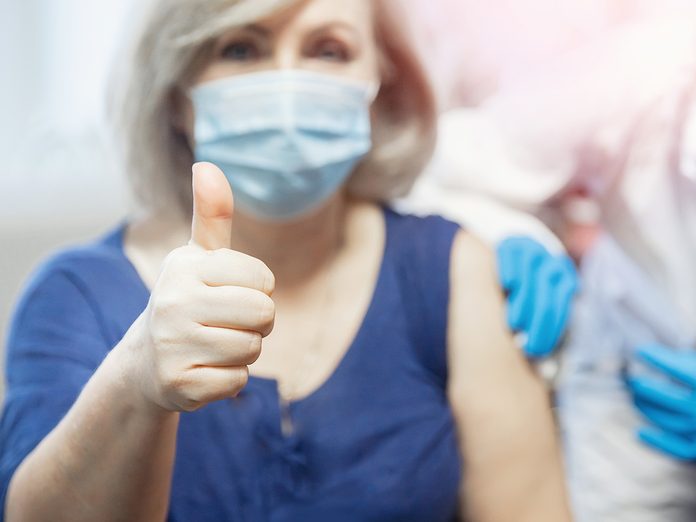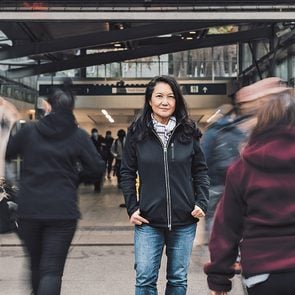Now That I’ve Got the COVID-19 Vaccine, Can I Visit My Family?

As the COVID-19 vaccine rolls out across Canada, infectious disease specialist Dr. Isaac Bogoch shares tips on how to keep your family safe.
Reader’s Digest Canada: What kinds of behaviours become safe after you get the COVID-19 vaccine?
Dr. Isaac Bogoch: We’re entering a period of time in Canada where some of us have not yet been vaccinated. Some of us will have one dose of a two-dose vaccine series and some of us will have completed a full two-dose vaccine series—and the ratios between those three categories is going to change with time as the vaccine program rolls out.
We have not yet heard guidance from senior public health leadership in Canada as to what acceptable behavior will be while we have people with no vaccinations or partial vaccinations. However, the United States’ Centers for Disease Control and Prevention has come out with some very clear guidelines on what fully-vaccinated people can do. That includes, for example, that you can get together with other fully-vaccinated people for a small gathering in someone’s house, without masks and without physical distancing.
That’s great. So the vaccines are working, then?
We know that the vaccines are really, really good. Regardless of which vaccine we’re talking about, it will significantly reduce the chance that someone is going to get COVID-19. And if someone is unlucky enough to get COVID-19 after vaccination, their probability of getting sick or requiring hospitalization is greatly reduced.
If someone is partially or fully vaccinated, can they still carry the virus and transmit it to other people?
We know from clinical trials and real-world data that’s been published that people who are partially vaccinated or fully vaccinated can still get the infection and can still transmit it to others. However, it appears that the risk of getting the infection is really, really small and the risk of transmitting to others is also greatly reduced following vaccination. It’s not zero per cent, but it’s significantly lower.
Given that, could a fully vaccinated grandparent visit their unvaccinated child and grandchild?
If the grandparents are fully vaccinated, and their children and grandchildren are a low risk for COVID-19, the grandparents can certainly be close with them and hug them. The risk is that the grandparent will be infected, but since the grandparent is vaccinated, it would be extremely unusual for them to get infected. As for the others, it’s possible they could get sick, but it’d be very rare.
Okay, so how do you know if the rest of the family is low risk?
They’re low risk if they haven’t had significant exposures to COVID-19 and are completely without symptoms. So for the grandkid, it would probably depend on the school they’re in and where in Canada they live. Ultimately, though, it’s going to be hard to clearly define what low risk is. There’s not a cookie cutter answer here. We don’t want anyone to get this infection, but the main point is to protect older populations or people who are vulnerable to having severe outcomes.
For the two-dose vaccines, what’s the difference between one shot and two in terms of risk of infection and transmission?
We know that two weeks after the first shot, people are provided with pretty significant protection against the virus. It’s not as good as having two shots but one shot still provides significant protection and we’ve even seen that in real-world data from the United Kingdom. Having said that, these are still two-shot vaccines and people won’t realize the full potential of protection until they’ve received their second dose. Personally, I think it’s reasonable for most people to wait until they’ve received the full course of the COVID-19 vaccine before they start to relax some of the restrictions in small group settings, and that’s what the CDC suggests.
Would you say waiting for the full course is more important for certain people?
It’s much more important for people on the older end of the spectrum and people with any degree of compromise to their immune system, whether it’s through a cancer diagnosis or medications they’re on. Those people are much less likely to be afforded the same degree of protection against COVID-19 following one dose of a vaccine compared to otherwise healthy, younger individuals with no compromise to their immune system.
If someone is fully vaccinated, do we know yet how long the vaccine is effective?
It’s not entirely clear yet what the duration of protection is for people who are fully vaccinated. It’s probably going to be different in different people—longer in younger individuals or individuals who don’t have any immune issues and shorter for older people or people who are immunocompromised. But we don’t yet know and that’s being studied.
Okay, but are we talking about weeks, or months?
I was thinking in terms of a year or more. Is COVID-19 something that we’re going to need an annual vaccine for? Hopefully not, but maybe. It might be every year, or every two or three years. Regardless, this is only the first version one of our COVID-19 vaccines and pharmaceutical companies are already creating vaccines that account for the circulating variants of concern right now. So no matter which vaccine people get in Canada in the spring or summer, we’re all probably going to need a booster shot at some point in the very tail end of 2021 or at some point in early 2022 that accounts for the variants.
How effective against the variants are the vaccines we’re getting now?
There are several different variants of concern and several different vaccines. In general, all the available vaccines work against the variant of concern that originated in the United Kingdom. And it appears that most of the vaccines will provide some degree of protection against the variants of concern that originated in South Africa and Brazil, but they don’t afford the same degree of protection. It’s not nothing but it’s lower in general. This is an active area of research and the pace of knowledge acquisition is moving very quickly.
Do you know if there’s going to be some kind of documentation or “vaccine passport” you get when you’re fully vaccinated?
I think many countries are figuring this out. Right now in Canada, you get a little slip of paper. In Ontario, there’s also an electronic record for everyone who is vaccinated that includes the time, date and type of vaccine. I think this is true for other provinces as well.
And will you need this proof to travel?
Already, you can’t travel to over 60 countries on the planet without proof of vaccination for yellow fever. That exists, and has been around for decades. If you show up at those countries, when you land and you get off the plane, they check for proof of vaccination. If you don’t have proof of vaccination for yellow fever, one of two things happens—you turn around and get on the first plane out of there at your own expense or you go to the little infirmary in the airport and they’ll vaccinate you for yellow fever and then you can come in.
So I would not be surprised if we start to see more and more countries wanting to see evidence of COVID-19 vaccination prior to entry. It doesn’t mean it’s right, but it’s likely going to happen. There’s obviously tremendous equity and ethical issues. Can you force someone to have a vaccine to enter your country? What if people are coming from low-income countries and don’t have access to vaccination there? Can you prevent them from travelling? If you’re a country that has access to vaccines, maybe you could provide those vaccines at the border for people that want to enter.
And do you think this proof of vaccination will need to be used for doing things closer to home?
Within a country, you’ll see something like what’s happening in Israel—if you’re vaccinated there, you can enter restaurants and bars and movies and other places where people congregate together. Whether we like it or not, I think that’s going to be part of our future.
Next, find out what’s meant by “herd immunity”—and when it’s expected to happen.






